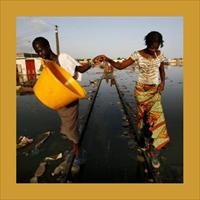WEST AFRICA: End of rainy season won’t bring an end to cholera

West Africa’s rainy season is coming to a close, but the yearly cholera outbreak continues to claim lives throughout the region.
In the hardest-hit country, Guinea-Bissau, the World Health Organization (WHO) says the situation is still “out of control” with 834 new cases and 15 deaths in the third week of October. This represents a 40-percent drop in new cases in the last few weeks, but the fatality rate remains high.
“I believe we can expect [cholera] to have declined throughout the region by December or January, more or less,” said Franck Bouvet, West Africa water, hygiene and sanitation specialist with the UN Children’s Fund (UNICEF).
In addition to Guinea-Bissau, Niger has seen a serious outbreak this year. Despite over 280 deaths in the two countries, Bouvet says prevalence is no worse than last year, just with different “hot spots”.
“There’s a real problem in Guinea-Bissau this year, whereas last year it was Guinea [Conakry]. It’s like a leaking pipe, you address the problem in one place and it resurfaces elsewhere.”
Health experts in the region said what’s needed is a regional strategy for fighting the disease, which kills hundreds of people in West Africa every year.
Guinea-Bissau
Guinea-Bissau, which has been struggling to control a widespread epidemic since May, reports 12,785 cases and 213 deaths. The capital Bissau has the highest number, with 8,480 cases.
On 20 October, the European Commission allocated 500,000 euros (US$653,000) to the international medical NGO Médecins Sans Frontières-Spain, for patient treatment, water purification, sanitation and hygiene promotion in Guinea-Bissau.
Benin
UNICEF data from 26 October shows a total of 912 people infected and two deaths in Benin since the first cases were identified in August. The majority of cases are concentrated in the commercial capital Cotonou, but the northern provinces of Malanville, Karimana, Djougou and Bassila are also affected.
“The situation in Cotonou is much better now,” said Hubert Chabi, executive secretary of the Red Cross Society of Benin. “With the support of the government and the Red Cross, we now have only 89 cases of cholera in treatment and no new cases for a week.”
The Red Cross has been working with the government in affected Cotonou neighbourhoods to disinfect water and promote hygiene standards.
“There has been regional cooperation to achieve polio eradication in West Africa,” he said. “I think if we could do this with cholera, it would allow us to learn and help each other prevent these outbreaks.”
Niger
In Niger, cholera is still widespread in the regions of Zinder, Tahoua and Maradi. In total, 948 cases and 70 deaths have been recorded since the beginning of the outbreak earlier this year, Khaled Bensaid, senior chief health and nutrition specialist at UNICEF, told IRIN.
Five of Niger’s seven regions are affected, the worst being Zinder with 483 cases and 53 dead. “The difficulty in Zinder is that there has been no official declaration of cholera cases since June. Instead everything is declared as gastroenteritis.”
The situation is improving, said Bensaid. “We have only had five new cases in the last week. But we cannot say for sure that it will not flare up again.”
Guinea
In April, a cholera outbreak originating in Boke, 312 km from the capital Conakry, was quickly controlled. “We have not had any new cases of cholera for two months now,” said Ousseni Maigana, head of water and sanitation programmes at UNICEF Guinea.
He said this is largely due to an intensive prevention and risk management campaign. “We used all communication channels to prevent the spread. This year we were not running behind the disease.”
UNICEF has been working with the government, national NGOs and other partners in to avert an outbreak similar to last year’s in which over 300 people died.
“We went to the source of last year’s epidemic. Often the outbreaks come from coastal areas where the cities concentrate large numbers of people and there is a lot of movement due to fishing and markets.”
Despite success in containing this year’s epidemic in Guinea, Maigana also emphasised the need for a collaborative strategy. “The fight against cholera must involve a combined effort across the region.”
Trends
Over the last 10 years, cholera epidemics in West Africa have tended to be annual outbreaks linked to the rainy season, UNICEF’s Bouvet told IRIN.
More recently, cholera outbreaks have been exacerbated by man-made factors, he said. “We have increasing numbers of cases over the rainy seasons. The cholera has become more and more pervasive and this is due to bad sanitation infrastructure in cities, lack of appropriate water source protection and inappropriate hygiene behaviour,” said Bouvet.
Another important factor across the region is the inability of national health systems to identify and monitor cholera cases, according to Bouvet.
“There is a long delay between someone getting cholera and notification of the case at the Ministry of Health. So this gives the disease time to spread.”
 Back and Next - Back and Next
Back and Next - Back and Next See Also - See Also
See Also - See Also